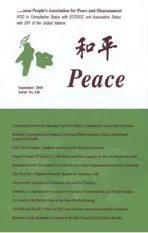No Conflict:the Bottom Line of the Indo-Pacific Strategy
2018-12-13ByLambaArvinder
By Lamba Arvinder
President,Institute of Peace and Conflict Studies,
Retired Lieutenant General,India
The Indo-Pacific region has become the centre of 21st-century geopolitics,wherein the regional and external powers are actively competing and collaborating with one another to counter and expand their own and others’influences.
Evolution of the Concept of Asia Pacific
The concept of Asia Pacific dates backs to 1960s,as a mean of linking East Asia to the wider Pacific region duly promoted by countries like United States,Japan and Australia."Asia Pacific"highlights the Asian dimension in a way that"Pacific region"does not.However,from a political perspective the United States cannot portray itself as an Asian power but its extensive involvement in the Pacific justifies describing it as part of Asia Pacific.
Power Rivalries and Contestations
During the post Cold War era,the international relations in Asia Pacific witnessed new international roles of China,Japan and the United States.The significant developments during the era were the Cold War conflicts in the 1950s and 1960s,Southeast Asia's decolonization,Sino-Soviet conflict,direct confrontation between United States and China in the context of the Korean War (1950-1953), Sino-American rapprochement,the emergence of Southeast Asian regionalism and postcolonial conflicts in Southeast Asia.
The end of the Cold War once again witnessed US main contest in Asia Pacific with China.Asia Pacific encompassed a broad range of political systems from liberal democracies to Communist and authoritarian countries.
Failure of Existing Mechanisms
“Regional institutions in the Asia-Pacific are not as robust as those that have evolved in Europe,”says Rudd. “Because the Asia-Pacific region looms as being the strategic cockpit of the 21st century,we need more robust institutions than those we have at present.”
It was felt that there needs to be an agreeable and sustainable power mechanism and structure to keep this region safe from conflict.
US identification of India as the most credible partner for stability in this region has been stark and forthright.To recall,the US State Department under Condoleezza Rice,during the George W Bush administration,declared its policy goal“to help India become a major world power in the 21st century.”Rex Tillerson’s recent remarks have added immense clarity to the future direction and drivers of this region.
What makes Indo-Pacific an active regional construct is the competitive and convergent security interests of actors such as Australia,China,India,Japan and the United States–who are the central actors in the region.
The Architecture and Mechanism of Power in This Region
The Indo-Pacific idea connecting the Pacific and Indian oceans now make a single geopolitical space and a new map of Asia,has witnessed significant changes in foreign and security policies and strategic partnerships.
The increasing importance of Indo-Pacific is evident in the strategic equations,most importantly,China’s “Maritime Silk Road”,India’s “Act East Policy”,United States’“Rebalance/Pivot to Asia”and Japan’s idea of“Confluence of the Two Seas”-all aimed at playing a proactive role in the Indo-Pacific region.
There cannot be a perfect model that meets all requirements of regional and external countries,but there is an urgent need for all powers to evolve a comprehensive,converging and objective system that is mutually acceptable and can enable prevent disputes,allow freedom of seas and ensure peace and stability in the critical region.
The Indo Pacific Region must be free from conflict.For that,the US,India,Japan,Australia and China can work to evolve such a control mechanism and structure.
杂志排行
Peace的其它文章
- Regional Security Governance in NortheastAsia:Major Opportunities and their Command
- CPAPD International Exchanges
- The Need for a Regional Security Regime in NortheastAsia
- Major Changes of China-U.S.Relations and their Impacts on the Asia-Pacific Security
- Sino-U.S.Strategic Cognition and EastAsian Regional Security
- Remarks at the Closing Ceremony of the 8th China-US Civil Peace Forum
